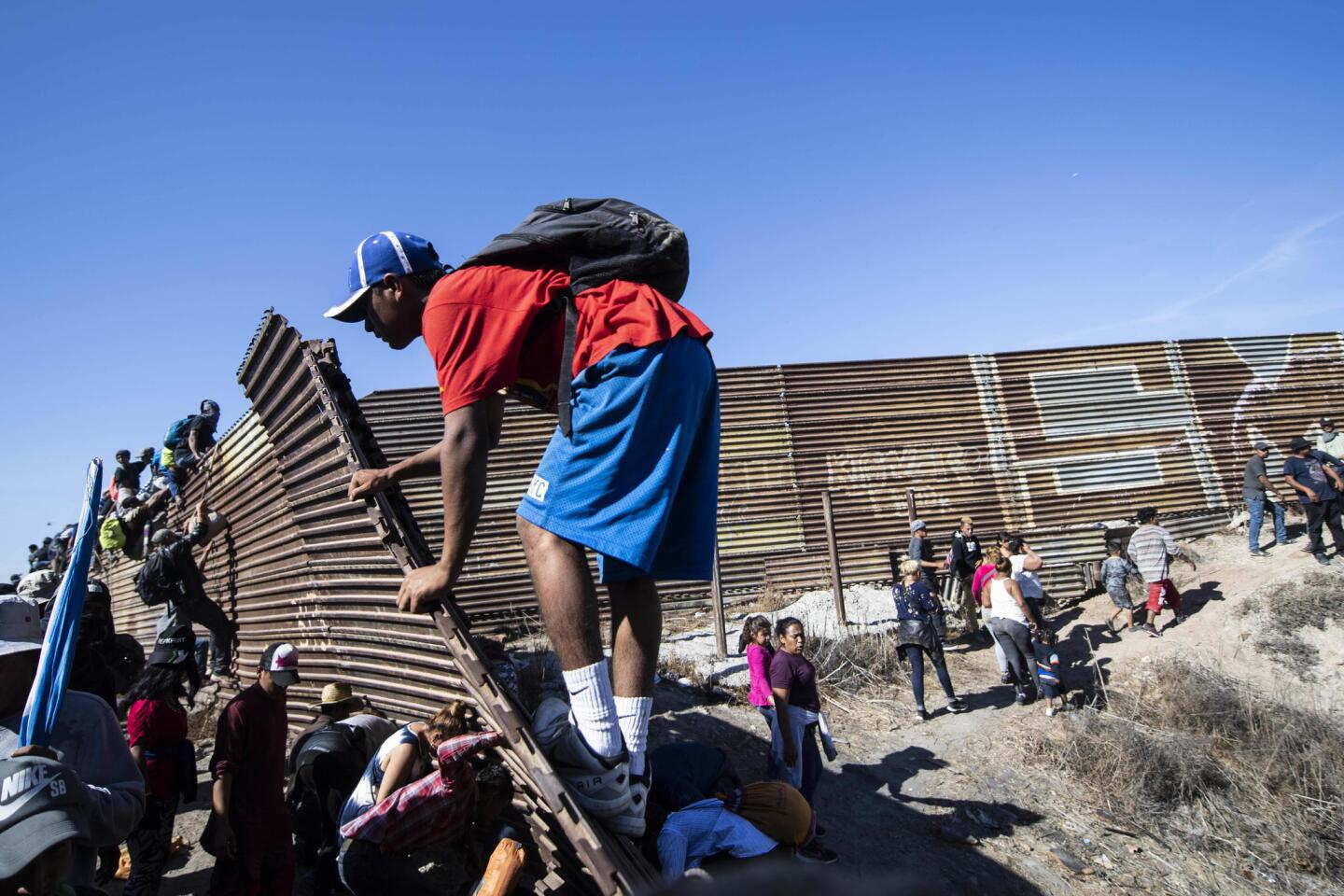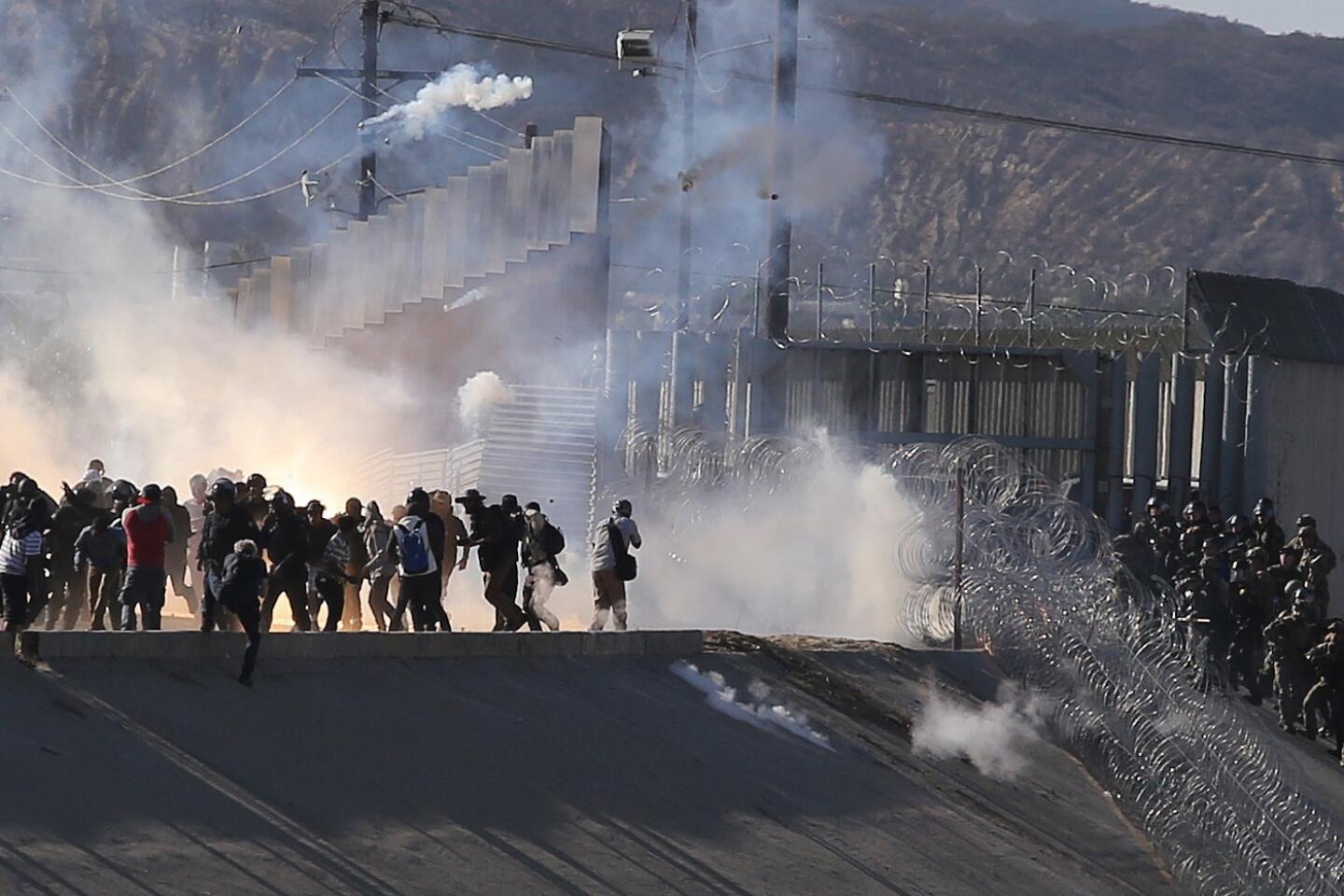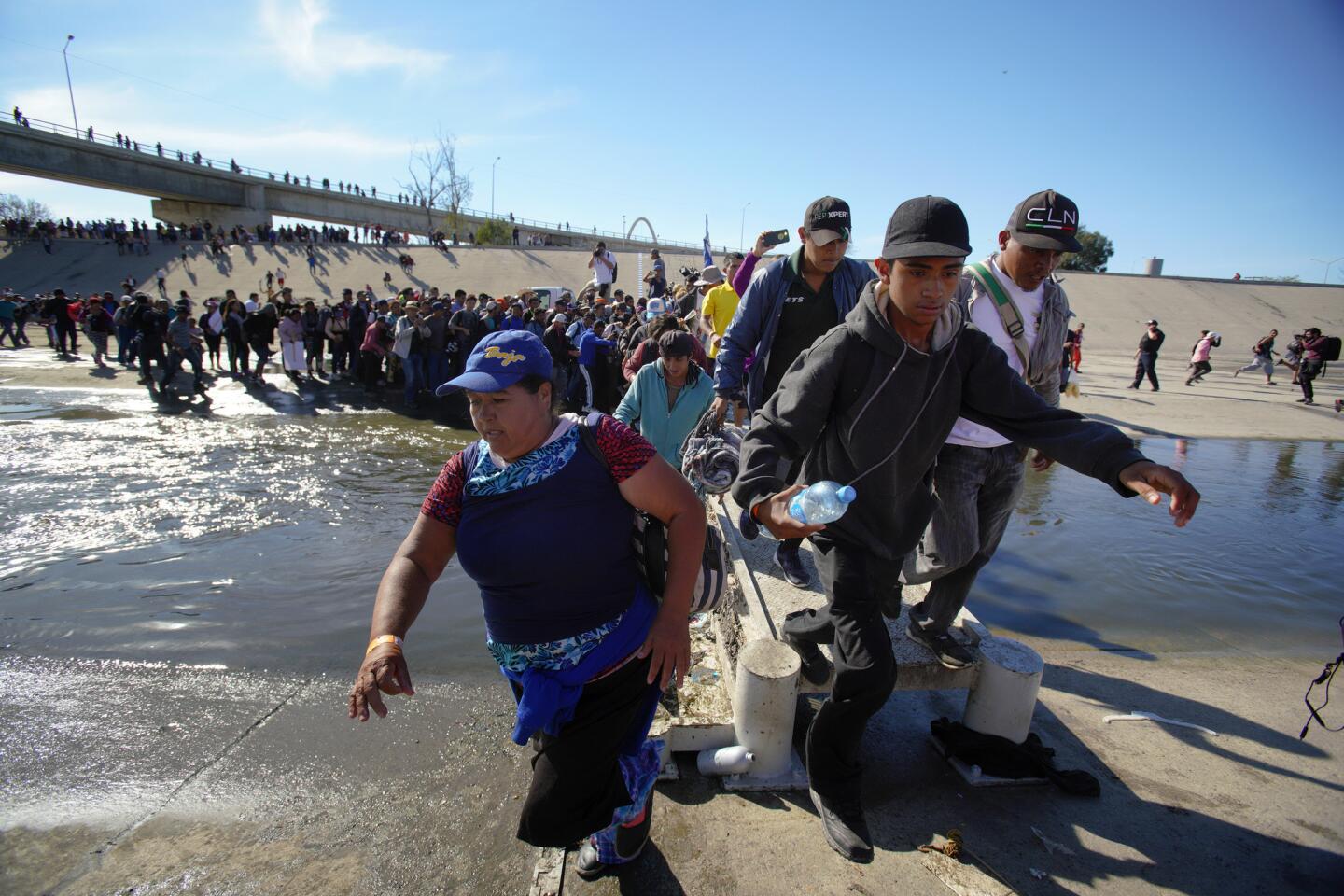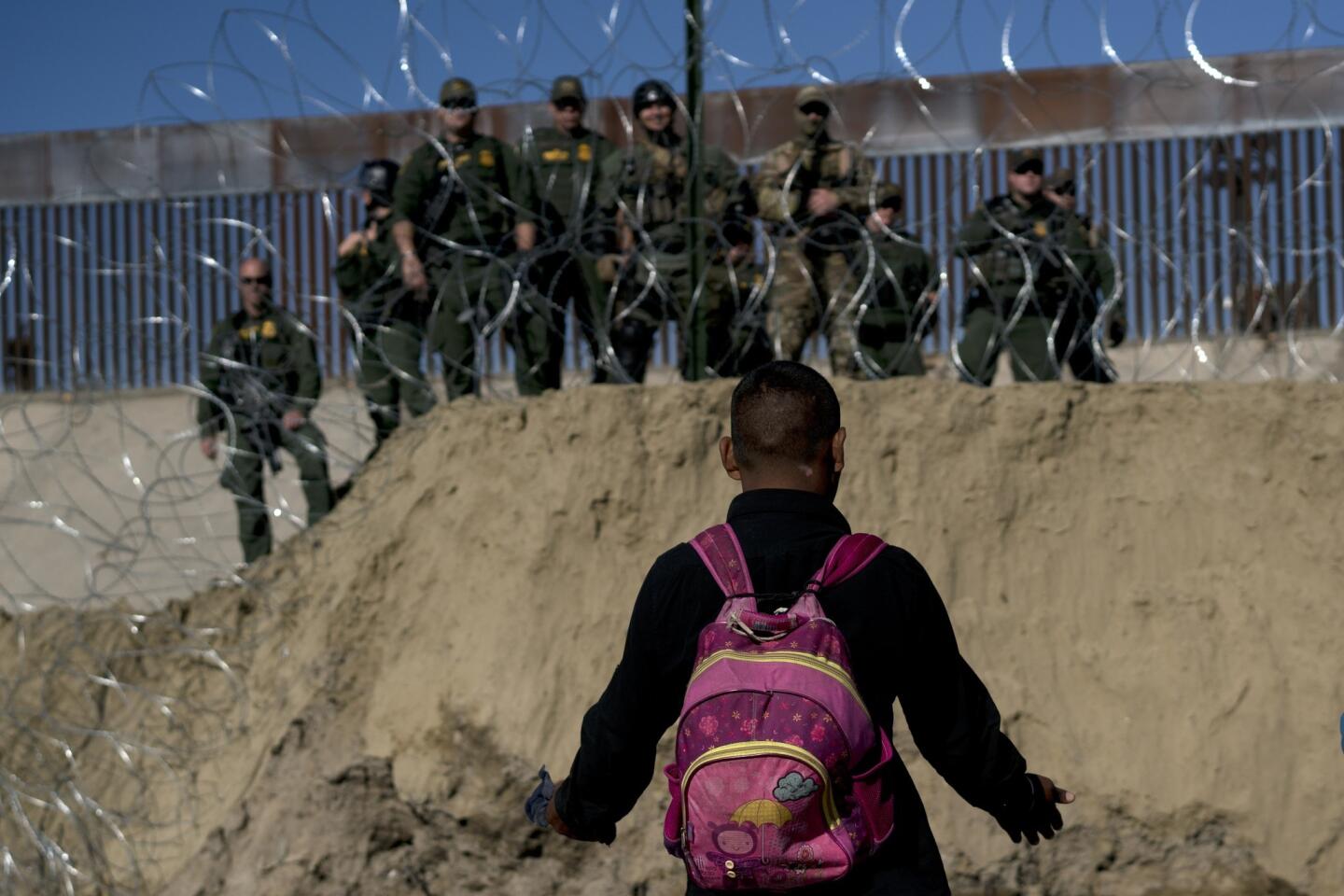Trump threatens to shut the Mexico border. California companies say that would create chaos

Trump on tear-gassing migrants: Agents ‘were being rushed by some very tough people’
- Share via
When President Trump issued yet another ultimatum to Mexico to stop a caravan of would-be refugees early Monday, he coupled it with an ominous threat: “We will close the Border permanently if need be. Congress, fund the WALL!”
In Torrance, Karen Quintana, president of the Los Angeles Customs Brokers and Freight Forwarders Assn., was perplexed. “He can’t mean trade as well,” she said. “He just meant people, right?”
But the prospect that a border shutdown might halt goods crossing the border — and not just immigrants, a frequent target of Trump’s ire — was not unthinkable. “You have to take it seriously,” said Quintana, whose trade association represents 300 logistics companies. Months earlier, she noted, California businesses had doubted Trump’s threat to launch a trade war with China — and then it happened.
Closing the border between California and Mexico at the peak of the Christmas season would create chaos, Quintana and others said.
It wasn’t the first time Trump had threatened a border shutdown. In October, as the caravan approached, he suggested he might use U.S. troops to do it. But after a five-hour closure at the San Ysidro Port of Entry on Sunday, when several hundred migrants rushed the border, the possibility seemed more real.
Trump’s tweet left unanswered questions, including whether the president was threatening to close the border just at San Ysidro, or across the entire 1,954-mile expanse, from the Pacific Ocean to the Gulf of Mexico.
Mexico is California’s biggest export market, purchasing at least $26.7 billion, or 15.6%, of the Golden State’s exports last year. And that understates the actual amount, said Jock O’Connell, a trade expert at Los Angeles consulting firm Beacon Economics. A substantial portion of California’s exports are transshipped to Mexico through Texas, and therefore are counted as Texas exports.
The San Diego customs district, which includes the border station of San Ysidro, where the caravan of would-be refugees is gathered, accounts for 12.1% of all U.S. imports from Mexico, including aerospace components and avocados. The amount of Mexican imports that remains in California, as opposed to being shipped through to other states, is not calculated, O’Connell said.
“Mexico is our largest trading partner,” said O’Connell, one of the state’s foremost trade experts. “The economies of the U.S., Canada and Mexico are tightly integrated.” Closing the Mexico border, he said, would amount to “cutting off your nose to spite your face.”
Even a temporary closure, as happened Sunday in San Diego, can wreak havoc.
“We have a shared workforce,” said Paola Avila, vice president of international business affairs at the San Diego Regional Chamber of Commerce. “Some industries report that half their workforce crosses the border: construction, restaurants, hospitality, convention center…. It’s very difficult as a business to be nimble if you lose half of your workforce in one day.”
It’s very difficult as a business to be nimble if you lose half of your workforce in one day.
— Paola Avila, vice president, San Diego Regional Chamber of Commerce
Although there are multiple ports of entry along the U.S.-Mexico border, San Ysidro is the busiest in the Western Hemisphere. About 70,000 vehicles and 25,000 pedestrians move between the two countries each day.
The San Ysidro ZIP Code has 650 businesses, most of them mom-and-pops, and 93% of their customers come from Mexico. The Sunday shutdown, the chamber estimates, cost them $5.3 million in sales.
A border closure could also have a drastic effect on California tourism.
“Visitors from Mexico fuel a tourism economy that benefits all Californians,” said Caroline Beteta, president of Visit California, the state’s tourist office. “Mexico is by far California’s top international market, responsible for more than 40% of California’s international visitor volume and $3.1 billion of visitor spending every year.”
In the last 20 years, two-way trade in goods between Mexico and the United States increased dramatically, from $81.4 billion in 1993 — the year before the North American Free Trade Agreement took effect — to $557.6 billion in 2017. And Mexico has remained the United States’ second-largest export market since 1995, with a total value of $242 billion in 2017.
“Across the entire border, you have more than 1 million crossings a day, $1.6 billion in two-way trade every day,” said Duncan Wood, director of the Mexico Institute at the Wilson Center in Washington, D.C. A shutdown, he added, would mean “disastrous, catastrophic losses on both sides of the border.”
Some California executives expressed skepticism that Trump meant what he said.
“All you can do is laugh,” said Marv Sepe, a senior vice president at CTC Global, an Irvine manufacturer, and chair of the District Export Council of Southern California. “I don’t think companies can make plans based on a tweet. Trump is a powerful guy and can say what he likes, but there are procedural issues. I don’t think you can just shut the door. There would be tremendous outrage.”
In Rancho Santa Margarita, Said Hilal, chief executive of Applied Medical Resources, a surgical equipment manufacturer, suggested that “anything is possible with this administration. But really, there comes a time where we can’t be in an economic war with the rest of the world. It is not reasonable.”
Only $4 million of Applied Medical’s $600 million in annual exports goes to Mexico, so the company could easily survive a shutdown. But many medical device companies, such as Johnson & Johnson — the pharmaceutical giant that manufactures most of its devices in Juarez and ships them across the border to Albuquerque for packaging and worldwide distribution — could take a massive hit if the border closed, according to Gary Johnson, president of Applied Medical’s Surgical Group.
“We are most concerned about patients in Mexico,” he said. “Only U.S. companies are manufacturing minimally invasive surgery devices. So they would have to resort to open surgery if the border closes.”
O’Connell, the Beacon trade expert, was not taking Trump seriously.
“These injudicious tweets are directed at the people who watch Fox News and are terrified at the idea of some poor refugees trying to gain access to the American dream,” he said. “Trump is trying to scare his base. What would the purpose be of halting trade? Who would you be trying to penalize? This is more political than economic.”
San Diego Union-Tribune staff writers Lori Weisberg and Rob Nikolewski contributed to this report.
More to Read
Inside the business of entertainment
The Wide Shot brings you news, analysis and insights on everything from streaming wars to production — and what it all means for the future.
You may occasionally receive promotional content from the Los Angeles Times.





















